All year round, there are delicious fruits and veggies for each season. One of them is the acorn squash. Technically, squash is a fruit, but most of us prepare it and consume it as a vegetable.
Often, what we like to eat, we also give to the guinea pigs. Let’s find out if this delicious fruit can be good food for the adorable cavy.
Can guinea pigs eat acorn squash? The guinea pigs can safely eat acorn squash. This type of fruit is rich in nutrients that are good for the cavy, such as vitamin A and vitamin C. Just like other fruits and veggies, this also must be given in moderation. Anything given in moderation makes balanced nutrition with a variety of foods.
It’s always a good idea to introduce new foods to the cavy. The acorn squash can be a real treat if served properly. It’s tasty and healthy, but some parts of it are not eaten. As with any fresh produce, certain parts are not eaten at all. Let’s go into details about this fruit.
Table of Content
Is Acorn Squash Good for Guinea Pigs? | Health Benefits
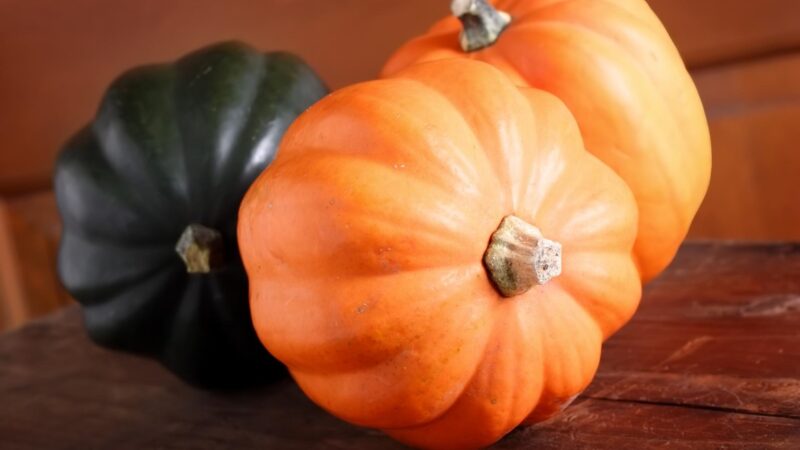
The squash is a very beneficial and healthy food for your guinea pig. Because it has lots of nutrients, it protects the organism of the guinea pig from many diseases. The ingredients in the squash can even fight diseases or prevent them.
Eating squash can make the immunity of a guinea pig stronger because it contains essential vitamins and minerals. There is a good amount of vitamin C, the essential vitamin for guinea pigs. Vitamin C keeps cavies healthy, and a deficit of this vitamin causes scurvy.
If the cavy doesn’t get enough vitamin C, some of the symptoms are a rough coat, loss of appetite, diarrhea, or oral problems with the mouth and teeth. Even more important, vitamin C helps in creating collagen. And, collagen is extremely important for tendons, muscles, ligaments, and connective tissues.
The carbs in squash give a good, fast release of energy in a short time. The natural protein in squash keeps the cavy energetic, with healthy muscles, and energy all day long.
The squash also has good fibers that improve digestion. The digestive system of the cavy is a bit fragile as it is. But with the production of this kind, digestion is much better.
The potassium in the squash balances the water-electrolyte ratio in the cavy’s body. This means the cavy won’t have spasms or aches in the body.
The manganese in the squash acts as an antioxidant. It prevents aging, diseases, and damaged immunity. Squash also has magnesium – this mineral keeps all muscles healthy. The cavy will have a healthy heart and strong healthy muscles all over.
Vitamin B6 in squash keeps nerve and brain cells in perfect health – this is especially good for pregnant cavies and their pups (for healthy brain development).
There is also vitamin A which is the strongest antioxidant. With this, the cavy will have great immunity, great vision, and all organs inside will be in perfect health.
Overall, the squash will boost immunity, and prevent dangerous diseases like cancer and heart problems.
Nutrition Facts of Acorn Squash
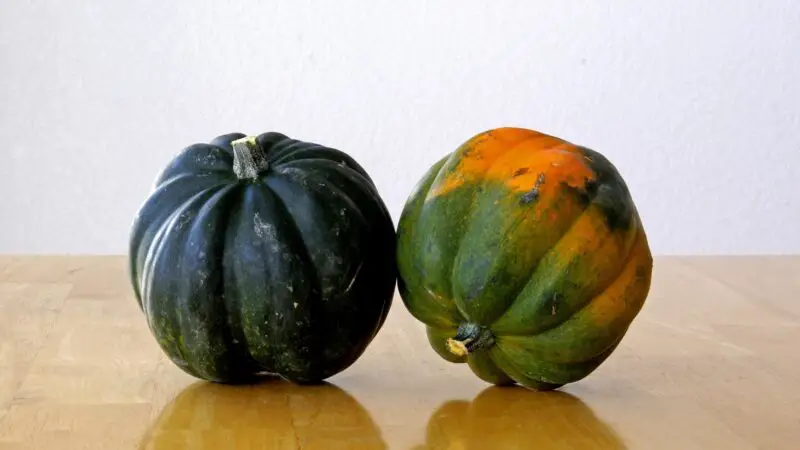
A cup of acorn squash contains:
- Total of 115 calories
- Carbs – 9 g
- Protein – 3 g
- Fat – 3 g
- Fiber – 9 g
- Vitamin C – 37%
- Potassium – 26%
- Manganese – 25%
- Magnesium – 22%
- Vitamin B6 – 20%
- Vitamin A – 18%
- Iron – 11%
- Calcium – 9%
Is Acorn Squash Bad for Guinea Pigs? | Possible Risks
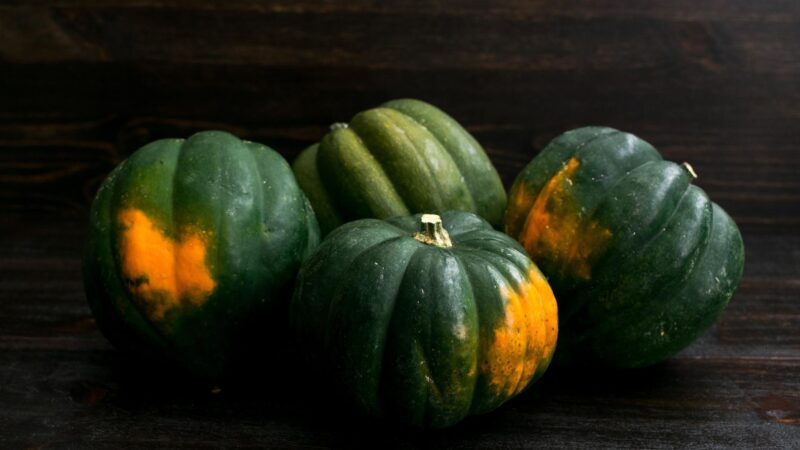
One of the risks of giving squash to the cavy is the phosphorus and calcium amounts in the squash. If the calcium and phosphorus ratio is imbalanced, the cavy would have many problems with the urinary tract and organs.
Both calcium and phosphorus are codependent and contribute to the metabolism of proteins. Also, both affect the urinary tract and organs of the cavy.
Too much calcium causes bladder stones and kidney stones. This will make urinating painful or unpleasant. The role of phosphorus, on the other hand, is to help with the digestion of carbs and fats. Also, phosphorus creates proteins for development and growth and repairs tissues and cells.
So, if the ratio of calcium-phosphorus is not balanced, the cavy will have stones in the bladder and kidneys. It will metabolize proteins differently and cells/tissues will not be in perfect health.
Acorn squash is very healthy and tasty to cavies, but it must be given in moderation. If you give too much squash or too often, the cavy might get diarrhea. This is because the squash has natural sugars and lots of fibers.
Fibers in the squash can cause bloating, cramps, flatulence, and diarrhea. Basically, the squash is healthy but if your pet ingests the excess amount of squash fibers, the stomach will try hard to process those fibers. The result will be either pain or diarrhea.
Serving and Frequency of Acorn Squash for Guinea Pigs
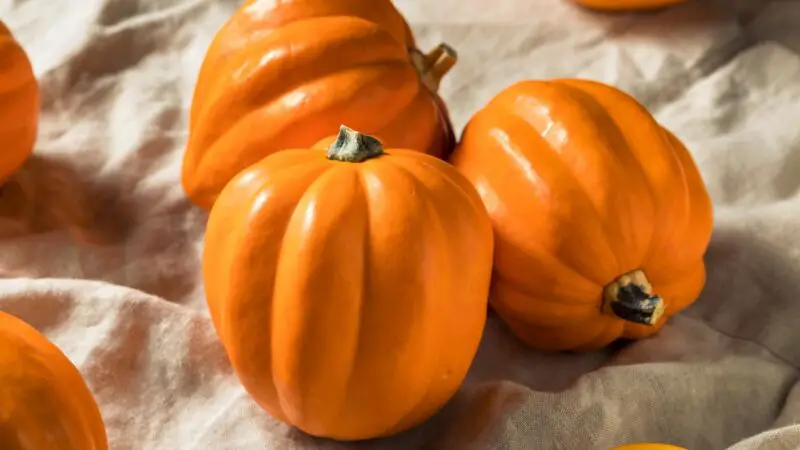
The guinea pigs can eat squash 2-4 times per week. This is fine since you may vary the cavy’s diet with other foods and fresh produce on other days. Also, a proper squash serving for the cavy is 3 oz (or 100 g).
It’s always important to have a variety in the diet of your pet. Plus, you can prevent the potential side effects of eating too much squash if you serve it a few times each week.
More Information About Acorn Squash and Guinea Pigs
Which Part of the Squash Should the Guinea Pig Eat?
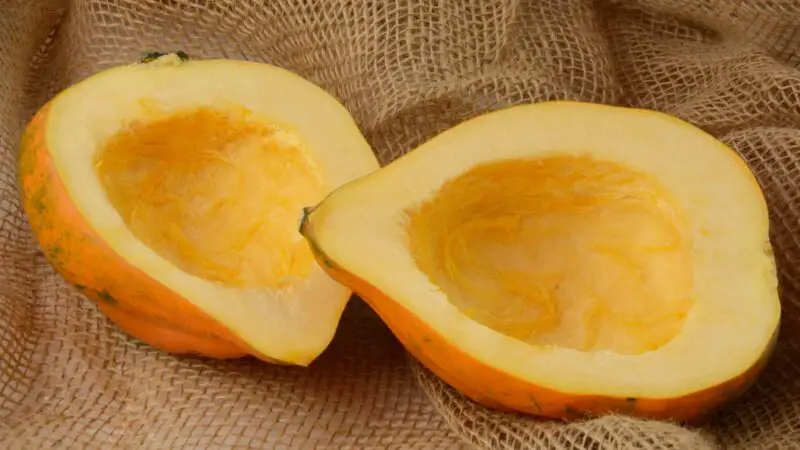
When you give acorn squash to the cavy, avoid all things that are added on the side – butter or spreadable foods. The squash should be given plain without additions on top.
Also, not everything from the squash is consumed by cavies. Remove the stem, skin, stringy parts, and seeds. Cavies eat just the flesh parts, the orange flesh inside.
Should the Guinea Pig Just Eat Raw Squash?
The squash has to be raw, fresh, and clean (no pesticides). If the squash was never sprayed with pesticides, just wash it, peel it, and cut cubes from the orange flesh inside.
It is confirmed that squash in moderation is healthy for the cavy, but some cavies dislike this taste. It might help if you mix the squash with another food item the cavy likes (some veggie or fruit that the cavy loves). This way, the cavy would at least try the squash, if it’s next to the other food.
What Should You Do if Your Guinea Pig Dislikes Acorn Squash?
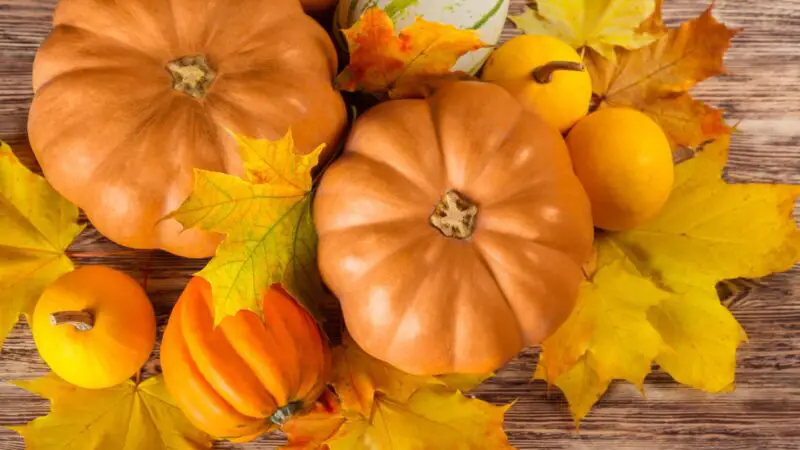
If your adorable furry friend dislikes the plain acorn squash, you can mix it with something else. This is a good way of introducing new food for the cavy.
For example, you can add peas, carrots, green beans next to the squash chunks. Any way you serve it, keep in mind: must be in moderation. Use only the orange flesh, and is preferable to mix it with other veggies on the side.
Quick Facts on Acorn Squash and Guinea Pigs
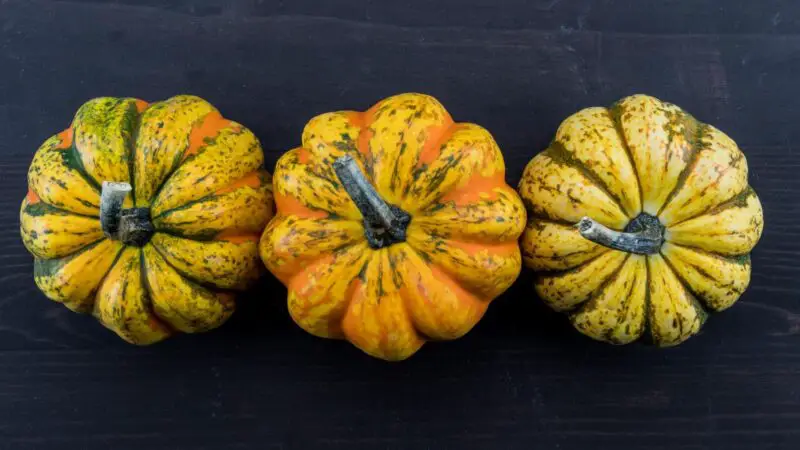
- Acorn squash is healthy and beneficial for cavies.
- Acorn squash is considered a vegetable but technically is a fruit.
- This fruit is safe and healthy for the cavy; if given in moderation.
- The cavies either love or dislike the taste of acorn squash.
- Both winter squash and summer squash are safe for the guinea pigs.
- Squash has the essential vitamin C for the overall health of the cavy.
- It also has carbs and proteins.
- Squash has calcium and phosphorus. If eaten in excess, this can cause upset stomach and urinary stones.
- Excess squash for the cavy can also cause bloating and flatulence.
- Squash is also rich in antioxidants and essential minerals for the cavy.
- Acorn squash can be given 2-4 times per week to the guinea pig..
- The regular serving of squash for the cavy is around 3 oz.
- The squash must be clean, organic, and raw.
- Stem, skin, stringy parts and seeds are thrown away – only orange flesh is eaten.
We have also made a full list of foods that guinea pigs can and can’t eat (150+ Types of Foods). Be sure to also check our recommended products page for everything you will ever need to assure a happy life for your guinea pigs. Hope this information was helpful and you have found the answer you were looking for.
List of Sources
Vitamin C Requirements of the Guinea-Pig
Nutrient Requirements of Laboratory Animals: Fourth Revised Edition
The Effects of Diet on Anatomy, Physiology and Health in the Guinea Pig
